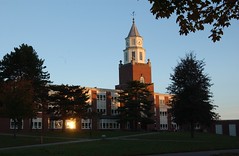Maged Basharahil
Reference: Shulman Matthew. (Feb 25, 2008), 21st-Century Dentistry. US & World Report. Retrived (June 04, 2008),from www.ebscohost.com.
Summary:
The article “21st-Century Dentistry” shows us some of new findings in Dentistry. The author explains three novel methods used in dental clinics. The advanced findings reduced pain, treatment and healing time. The author mentions the laser-assisted new attachment procedure, or LANAP, mini-implants, and digital impression technology. The LANAP can treat infected gums without using scalpels. It killed the bacteria and infected tissue by color distinguishing, helps reform the surrounding tissue, and less reinfection happen. Also, the laser heat seals gums and creates a physical barrier to bacteria. Also, it is used in reshaping gummy smiles in cosmetic clinics. The second advanced technology is Mini-implants. In fact, this kind of implants help the limited jaw bone patients to wear dentures. Also, it does not require scalpels, it is cheaper than conventional implants and can be inserted in one visit. At last, digital impression technology, that is used instead of traditional paste impression used in restorative treatment. It is more comfortable for patients, has less waiting time, and gives the patients more options to select color and type of restorative materials.
Reaction:
First of all, this article definitely interests me. Although, I am a dentist, I found new information in “21-st Century Dentistry”. For example, I am really happy to hear about Mini-implants finding. It will end the aging problem because in the past, we could not do implants of patients with limited bone in their jaws. These new findings helps the patients as well as the dentists. Also, digital impression helps the patients who suffer from gag reflex. In other words, some patients feel nausea and vomiting while impression taking. But, with the digital impression will finish this problem. Finally, I hope the scientists keep discovering new results.
Monday, June 23, 2008
21st-Century Dentistry
Posted by CESL at 11:10 AM
Subscribe to:
Post Comments (Atom)
 on
on 




0 comments:
Post a Comment